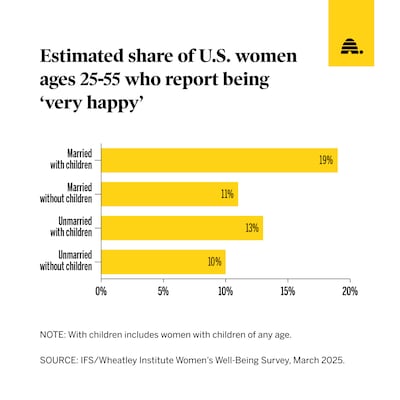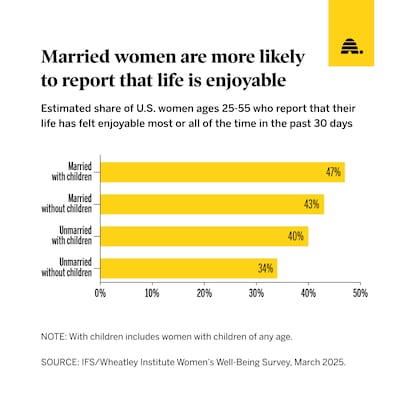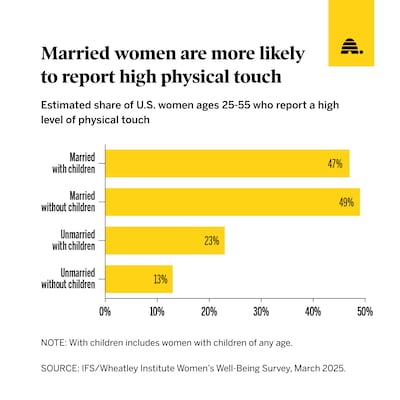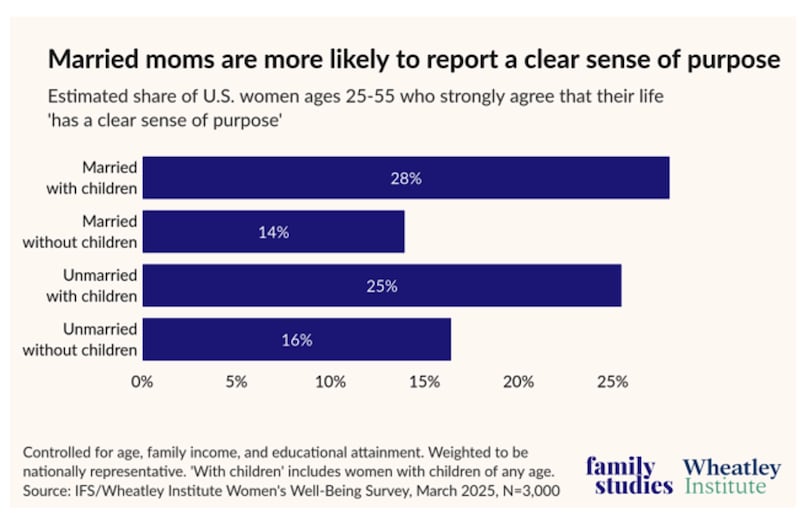- A growing number of young women look upon parenting warily, while 74% see job and career as a source of a fulfilling life.
- Yet national surveys repeatedly show that married women with children are happier — up to twice as much — compared with women who are single or childless.
- Married women also report high levels of physical touch (e.g., kissing, cuddling, holding hands), more than double the rates of other women.
- Even as motherhood transitions women into greater exhaustion and less “me time,” this often corresponds with an increase in meaning, purpose and happiness.
- Only 1 in 5 single mothers say they are connected with a local community group, compared with 38% of married mothers — highlighting a need to provide additional support.
A few months ago, a student reached out to talk about something she was wrestling with in her personal life. She had been happily married for two years, was nearing college graduation and now faced the real possibility of starting a family. She had always wanted children, and loved being part of a large family, but was startled by her fear about how children might change her life.
What would a baby do to her sense of identity, her dreams of what she wanted to do and become, her deeply valued freedom and autonomy? Something she had looked forward to now felt threatening, like choosing a transition of loss.
She is not alone. A recent Pew Research Survey found that less than half of young women who do not have children (45%) said they want to be parents someday.
Young women are increasingly more educated than their male peers and tend to report more professional ambitions and aspirations for personal success. Family life seems to have become a more distant or lower priority.
Another poll, in fact, shows that women are more likely than men to see job or career enjoyment as a source for a fulfilling life (74% vs. 69%), and both genders view marriage and parenthood near the bottom of a list that contributes to a fulfilling life.
A third poll by the American Survey Center shows only 1 in 3 women in the U.S. believing that “women who get married and have kids live fuller and happier lives than those who don’t.”
Yet, data on happiness and well-being consistently tells a different story.
More marriage, more happiness
In 2022, the General Social Survey, the nation’s leading social barometer, found that married mothers are happier than single childless women, married childless women and unmarried mothers.

Similarly, our new IFS/Wheatley survey of 3,000 U.S. women aged 25-55 found that nearly twice as many married mothers say they are “very happy” compared to single childless women, married childless women and unmarried mothers. Married mothers are also most likely to say that life is enjoyable most or all of the time (47% vs. 34%). And though we expected parenting alone to be linked with less happiness compared to women without children, a higher percentage of unmarried mothers identified as “very happy” than did married childless women or single childless women.

More touch, more happiness
Surprisingly, perhaps, our findings indicate that the increased likelihood of being very happy is linked to physical touch. Almost 50% of married mothers and married women without children report high physical touch levels (e.g., kissing, cuddling, holding hands) compared to 23% of unmarried mothers and just 13% of unmarried women without children. In findings adjusted for women’s age, income and education, those with high levels of touch are three times more likely to report being very happy.

From the beginning of life, touch lays the foundations for the emotional connection we depend on for development. Touch elicits the release of oxytocin, promoting relaxation and reducing stress, while decreasing the sympathetic nervous system’s stress response.
Family life — including marriage and children — is our primary source of touch throughout our lives. Touch from loved ones has been linked to relaxation, increased trust, greater feelings of safety and increased emotional resilience.
In our highly digital age with fewer face-to-face interactions, and a dramatically decreased marriage rate, many are experiencing “touch hunger.” But evidence suggests it plays an important role in our emotional and social health.
Notably, mothers in our study were more likely than other women to say they felt “overwhelmed” and “exhausted” every day. They were more likely to report that they wished they had more time for themselves. But these same women were also most likely to feel that “what I do in life is valuable and worthwhile,” and that “my life has a clear sense of purpose.”
Therein lies the great paradox that many are trying to sort out. Motherhood is often a transition into greater exhaustion and less “me time.” But that is actually part of the story of increased meaning, purpose and happiness.

In recent research by Catherine Pakaluk on women’s experience of motherhood, one woman stated, “(Motherhood) gives us structure and allows us to grow and feel connected to something higher than ourselves.”
Through the personal growth built into motherhood, these mothers described becoming a truer self. The giving up of independence in mothering another appears to give way to the finding of a deeper identity. They were experiencing what writer Wendell Berry describes: “It is in these ‘bonds’ that our individuality has a use and a worth; it is only to the people who know us, love us, and depend on us that we are indispensable as the persons we uniquely are.”
More support needed, especially for single mothers
None of this should obscure the realities that make motherhood difficult. The isolation of mothers in the current era of intensive parenting has the potential to disrupt the critical role of community in the work of nurturing life. It takes a village to raise a child, as the old saying goes.
Yet many mothers today find themselves without that village and social connections. This is especially true for single mothers, with only 1 in 5 single mothers (20%) saying they are connected with a local community group, compared with 38% of married mothers, according to the new IFS/Wheatley survey.
These findings shouldn’t obscure the importance of women’s personal development and essential contributions in spheres outside of nurturing children. Cultural narratives that define mothers as needless, wantless, desireless humans whose lives are defined by others’ needs undermine the agency and power of women to choose the privilege and sacrifice of giving and nurturing life, and the unparalleled development that comes with it.
Our study also confirms the critical role of marriage in motherhood. Many of the health benefits of motherhood for women, such as less loneliness and better mental health, apply primarily to married mothers. Marriage to a caring spouse offers the stabilizing and supportive context that lifts the burdens of motherhood and strengthens mothers’ experience of happiness, connection and meaning.
Single mothers are often the unsung heroes among us and should be strengthened in every way within our communities.
We really are relational beings. The cultural narrative shaping our perceptions may lead us to believe that happiness is found in pleasure-seeking autonomy. But the core relationships of life — marriage and parenthood — are designed to enable the flourishing we yearn for.
Motherhood offers an unparalleled opportunity for connection, meaning and intimacy. Believing that in today’s culture may take faith. But it is a faith worth acting on.



